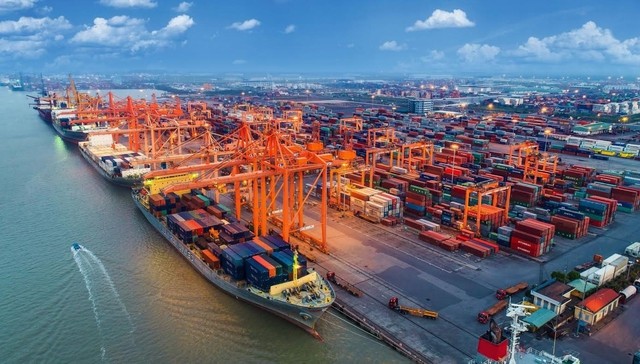 |
In August, Vietnam's total trade value hits US$60.92 billion, marking an increase of 6.7 percent compared to the previous month. (Photo toquoc.vn) |
Vietnam enjoyed a trade surplus of US$20.19 billion in the first eight months of this year, according to the General Statistics Office (GSO).
However, the total trade value in the period posted a year-over-year decrease of 13.1 percent to US$435.23 billion. Specifically, export value hit US$227.7 billion, a fall of 10 percent year on year and import value was down by 16.2 percent to US$207.52 billion.
In August, the country's total trade value hit US$60.92 billion, marking an increase of 6.7 percent compared to the previous month and a decline of 7.9 per cent compared to the same period last year.
In eight months, 30 items posted export turnover of over US$1 billion, accounting for 91.8 percent of the country's total export turnover. Particularly, five commodities posted an export turnover of more than US$10 billion, accounting for 58.4 percent.
The US was Vietnam's largest export market with an estimated turnover of US$62.3 billion, while China was Vietnam's largest import market with US$68.1 billion.
To further improve the trade revenue, the Ministry of Industry and Trade has planned to strengthen trade promotion activities for new and potential markets like India, Africa, the Middle East, Latin America, and Eastern Europe, and the markets less affected by inflation like ASEAN.
The ministry expected the exports to recover since the fourth quarter of this year due to many advantages such as the US market's recovery of import demand.
Besides that, the UK's accession to the Comprehensive and Progressive Agreement for Trans-Pacific Partnership (CPTPP) will bring more opportunities for Vietnamese exports.
Meanwhile, the Ministry of Agriculture and Rural Development (MARD) reported that Vietnam's total export-import turnover of agro-forestry and aquatic products in the eight months of this year was estimated at US$59.69 billion.
Of which, US$33.21 billion was worth of exports, down 9.5 percent annually, but still resulting in a trade surplus of US$6.72 billion.
In August alone, agro-forestry-aquatic products brought home US$4.36 billion from exports, down 6.5 percent annually.
Several commodity groups posted an increase in export value, such as fruits and vegetables, rice, and coffee.
Especially, Vietnam earned US$3.45 billion from exporting vegetables and fruits in the first eight months of 2023, up 57.5 percent year-on-year, according to MARD.
The figure exceeded last year’s export turnover of US$3.16 billion. And with that growth pace, it is expected to surpass the record of US$3.81 billion set in 2018.
China remained Vietnam’s largest veggie and fruit importer, accounting for 65 percent of the revenue in eight months.
According to Deputy Minister of Agriculture and Rural Development Hoang Trung, in the coming time, the Central Highlands region will enter the main durian crop, which is off-season compared to other countries. This will be an advantage in helping the export value surge.
To date, more than 300 durian growing area codes and nearly 100 packaging codes have been granted.
Dang Phuc Nguyen, General Secretary of the Vietnam Fruit and Vegetables Association (Vinafruit), said that with the two-digit growth rate at present, the export revenue of vegetables and fruits could hit the US$5 billion mark.
Meanwhile, rubber, tea, cashew nuts, pepper, and cassava and its products saw their export prices fall by 2.6-19.6 percent.
China, the US, and Japan remained the top three importers of Vietnamese agro-forestry and aquatic products, with China accounting for 21.9 per cent, up 9.8 per cent; the US 20.6 percent, down 27.4 percent; and Japan 7.6 percent, down 10.6 percent.
Seizing market opportunities, especially in commodity groups of strength, the ministry has instructed localities to regulate production plans and boost exports, step up negotiations and market access for official exports while expanding export markets.
























